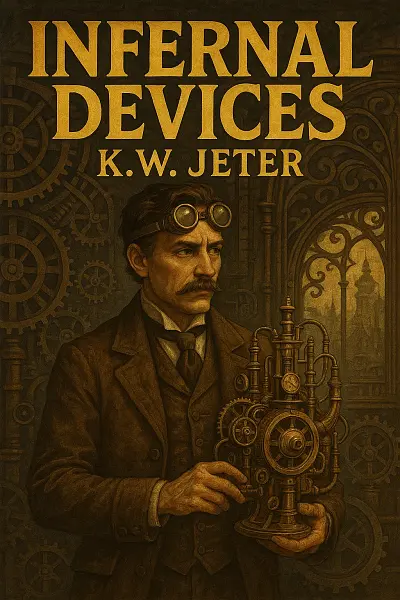
Infernal Devices
by: K.W. Jeter
George, a sometime musician with little knack for clockwork, inherits his father's quirky watchmaker's shop in a fog-laced, Victorian London. He’s barely settling into this odd, ticking world when a sinister stranger attempts to steal an ancient, mysterious device from the store, pulling George into a shadowy conspiracy.
Suddenly, George is swept up in a whirlwind of time-bending inventions, eccentric inventors, and seductive dangers. Forced far from his comfort zone, he must navigate tangled loyalties and twisted motives, grappling with the true price of curiosity. If he fails, reality—and his own sense of self—could unravel.
Jeter’s narration buzzes with dry wit, clever wordplay, and a deliciously weird, atmospheric charm. Will George step bravely into this infernal machinery, or will his doubts keep him stuck in time?
"“In a world built of gears and secrets, even the smallest cog can unravel the grandest deception.”"
Let's Break This Down
The Author's Voice
Atmosphere
Expect to be swept into a fog-tinged, clockwork-cluttered London where every shadow seems to hide a whirring secret. The mood here is thick with Victorian grime and eccentricity—think gaslit streets, eccentric inventors, musty parlors, and a constant sense of lurking danger. There's a whimsical eeriness that pulses through every scene, blending deep unease with a playful, almost mischievous curiosity.
Prose Style
Jeter's writing dances between witty, verbose dialogue and elaborately constructed descriptions. He seems to savor words, piling on details that are just as likely to amuse as to confound. The tone is slyly satirical, poking fun at Victorian mannerisms while wallowing in their excess. Expect sentences that twist and wind—sometimes charmingly ornate, sometimes teetering on the edge of overindulgence. There's a self-aware, tongue-in-cheek quality that keeps things lively, even when the plot gets labyrinthine.
Pacing
This is not a book that races from one revelation to the next. Imagine a mechanical contraption slowly unfolding its secrets. The story takes its time, favoring atmospheric buildup and character interactions over rapid-fire action. Some stretches linger over quirky dialogues or elaborate setups, making the rhythm uneven but immersive. The momentum comes in fits and starts: bursts of chaos punctuate stretches of steady world-building, so patience definitely pays off.
Dialogue & Character Voice
Dialogue crackles with clever banter and a certain Victorian pomposity that feels both affectionate and irreverent. Characters speak with exaggerated formality—plenty of dry wit, social awkwardness, and absurd observations. Everyone sounds like they might be hiding a secret agenda (or at least some outrageous invention). There’s a clear delight in playing with period-appropriate voices, making even mundane conversations entertaining.
World-Building & Imagery
Jeter lays out his steampunk London with loving, almost obsessive, attention to quirky machinery and bizarre contraptions. Narration lingers on gears, cogs, and mechanical oddities—everything feels teetering on the edge of absurdity, yet somehow plausible. Visual descriptions are vividly textured, conjuring a world that’s grimy and gleaming all at once.
Mood & Feel
Expect a blend of playful absurdity and creeping menace—like wandering a carnival that’s both wondrous and slightly sinister. The book revels in its weirdness, never taking itself too seriously, but always hinting at dark undercurrents beneath the charming chaos.
Overall Literary Rhythm
If you love a richly detailed, off-kilter, and darkly comedic ride—one that’s as invested in the oddities of its setting as in the mysteries of its plot—you’ll feel right at home. Bring your patience for the pacing, let the clever language wash over you, and enjoy the view from inside this bizarre, clockwork world.
Key Moments
- Clockwork chaos erupts in a rain-soaked, gaslit London—think gadgets on the loose and mad inventors everywhere
- George Dower’s deadpan wit meets outright existential dread as he discovers his father’s bizarre mechanical legacy
- Watch for that unforgettable automaton duel—steel, gears, and secrets whirring in the fog
- Victorian noir vibes with a retro-futurist twist—Jeter’s sentences practically hum with smoky energy
- Crooked conmen, cryptic clues, and a labyrinthine plot—don’t blink or you’ll miss a mind-bending reveal
- Themes of identity, invention, and human obsolescence running beneath every clanking, creaking machine
- That spine-tingling final standoff—equal parts slapstick, terror, and steampunk spectacle!
Plot Summary
Infernal Devices follows George Dower, a humble watchmaker in Victorian London, who inherits his father’s shop and soon finds himself embroiled in a bizarre conspiracy involving advanced mechanical creations (referred to as "infernal devices"). George’s life spirals out of control after a strange, clockwork-eyed customer requests a repair only his father could have executed. As George delves deeper, he uncovers a clandestine world of automata, shadowy societies, and human-clockwork hybrids. With the help of the mysterious Miss Brown, Dower faces betrayal and danger, culminating in a race to stop a catastrophic plot involving an ancient device. Ultimately, George confronts both his own identity and the legacy of his father’s genius, surviving the climax and realizing the device’s true purpose—leaving him changed but wiser.
Character Analysis
- George Dower starts as a cautious, somewhat unremarkable watchmaker but grows into a reluctant hero, driven by loyalty to his father’s memory and a desperate need for survival. His skepticism and awkwardness make him relatable, but frustration with his passivity might arise.
- Miss Brown is resourceful, enigmatic, and far more knowledgeable than she first appears; she guides and often manipulates George, teaching him to question everything around him.
- The Cat-Haired Men, antagonists with murky motives, serve as unsettling symbols of lost humanity through technology, creating an ever-present sense of danger.
- Through their interactions, characters are forced to confront their preconceptions about humanity, technology, and morality.
Major Themes
- The collision of tradition and innovation is everywhere: George’s craftsmanship clashes with the wild, unchecked possibilities of automata and invention gone awry.
- Identity and legacy run deep, with George haunted by—and ultimately embracing—the shadow of his father, struggling to define himself amidst chaos.
- The novel wrestles with humanity versus artificiality, questioning what makes someone truly human when machines become indistinguishable from people.
- Social satire sparkles throughout: Jeter pokes fun at Victorian classism, scientific hubris, and the absurdities of both progress and resistance to change.
Literary Techniques & Style
- Jeter’s prose is ornate and playful, reflecting a pastiche of Victorian language but laced with modern irony and wit.
- The first-person narrative puts us right inside George’s often overwhelmed head, adding an unreliable edge to the storytelling.
- Symbolism abounds: clockwork creatures and malfunctioning scraps echo George’s own search for clarity and purpose.
- The structure is episodic, mimicking serialized Victorian adventures, while metaphors and dark humor add bite and color.
Historical/Cultural Context
- Infernal Devices is set in a steampunk-infused late-Victorian London, where technology and tradition violently intermingle.
- Written in the 1980s, the novel is often credited with helping launch the steampunk genre, blending historical detail with speculative sci-fi and social commentary.
- Jeter lampoons 19th-century anxieties about industrialization—fears that technology could both elevate and destroy society, reflecting both Victorian and modern apocalyptic imagination.
Critical Significance & Impact
- Infernal Devices is a cornerstone of steampunk fiction, shaping how later writers and fans envision the genre.
- Though some find the plot meandering or the characters arch, its biting humor, inventive world-building, and genre-bending style have earned it cult acclaim.
- The book’s themes—about progress, selfhood, and the consequences of invention—remain weirdly timely, inviting new generations to question the world their own gadgets are creating.

Clockwork conspiracies ignite in Victorian London’s shadowy underbelly.
What Readers Are Saying
Right for You If
Okay, let’s be real: Infernal Devices by K.W. Jeter isn’t going to be everyone’s cup of tea—but if it’s for you, you’re going to have a blast.
Who’s gonna love this book?
- If you’re into steampunk, Victorian London, or just love a story that leans hard into bizarre clockwork gadgetry and weird science, this is where you’ll want to be. It’s a gem for anyone who wants their adventures with a heavy dash of quirkiness and mechanical mayhem.
- Love a story that doesn’t take itself too seriously and has a bit of a sly, satirical edge? Jeter’s humor and off-kilter tone totally nail that vibe.
- If you’ve devoured stuff like China Miéville, Philip Pullman, or even classic H.G. Wells, there’s a good chance you’ll slip right into this world and enjoy the ride.
- Also, if you get a kick out of convoluted plots, mad inventors, and a general feeling that anything can happen (and probably will), this will absolutely scratch that itch.
But heads up—this might not be for you if:
- You don’t vibe with super twisty, sometimes confusing plots. It’s a book that throws you in the deep end with zero apologies. If you want a straightforward story, it might leave you scratching your head more than once.
- If you’re not a fan of Victorian-style prose or you need action and pacing that moves at lightning speed, this might feel a tad slow or dense for your taste.
- You’re looking for deep character development—this one’s all about the wild ideas and weird worldbuilding, not so much about spending pages in a hero’s inner monologue.
- Romance readers, fair warning: love stories aren’t really the focus here—so if you need a swoon-worthy subplot, you may want to look elsewhere.
In short:
Steampunk fans, lovers of oddball sci-fi, and anyone who wants a wild, witty romp through a clockwork London—add this to your TBR. If you like your fiction clear-cut, fast, and emotionally deep, you’ll probably want to skip it. No hard feelings!
What You're Getting Into
Step into a brilliantly twisted, steam-powered Victorian London where George Dower, the unassuming watchmaker’s son, suddenly inherits his father’s legacy of bizarre mechanical inventions and mysterious enemies. When a strange gentleman appears with an odd contraption for repair, George is swept into a wild tangle of eccentric automatons, secret societies, and dangerous intrigue. Packed with sharp wit, quirky characters, and nonstop adventure, “Infernal Devices” delivers a wild steampunk ride that’s both clever and unpredictable!
Characters You'll Meet
-
George Dower: The somewhat hapless protagonist who inherits his father’s watchmaking shop and gets thrown into a wild steampunk mystery. He’s resourceful but constantly out of his depth, and his journey is all about adapting to bizarre circumstances.
-
Paxton: A strange, persistent client who drags Dower into the novel’s central intrigue with a mysterious automaton. He’s enigmatic and pushy, making him a catalyst for much of the plot’s chaos.
-
The Brown Leather Man: A menacing figure shrouded in secrecy, always lurking on the edges of the action. His role is to threaten and confuse, amping up the story’s tension.
-
Scape: Dower’s loyal but rough-around-the-edges friend who helps him navigate London’s underbelly. Scape’s street smarts and pragmatic approach complement Dower’s uncertainty, making him an invaluable sidekick.
-
Miss McThane: A daring and unconventional woman tied to the novel’s weirder inventions and conspiracies. She’s smart, unpredictable, and pushes the boundaries of Victorian norms, giving the story some spark and sass.
More Like This
*Fans of Philip Pullman’s His Dark Materials series will immediately feel at home with the vividly imagined, steam-powered alternate London that thrums at the heart of Infernal Devices. Both authors conjure up labyrinthine cities brimming with strange inventions, secret societies, and a lingering sense of danger lurking just beneath the cobblestones. Jeter’s world, though, leans even further into the mechanical and macabre, cranking up the clockwork tension to deliver a more gothic flavor than Pullman’s mythic grandeur.
*Readers who adore the intricate worldbuilding and quirky Victorian inventions in Gail Carriger’s Parasol Protectorate will find a similar—and arguably grittier—delight here. While Carriger spices her tales with humor and supernatural elements, Jeter’s approach is edgier and drenched in dark wit, offering whimsical contraptions and eccentric characters that feel both deliciously bizarre and oddly plausible.
On screen, the atmospheric mood and blend of technology with Victorian aesthetics in Infernal Devices calls to mind the TV show Penny Dreadful. Both spin tales that merge the eerie with the extraordinary, populating shadowy streets with unforgettable oddballs and haunted heroes. That same sense of brooding menace, literary references, and twisted innovation runs through both worlds—making this novel a great pick for anyone entranced by the chilling beauty of horror-tinged, steampunk storytelling.
Critic's Corner
What if the mechanisms that shape our destinies are no less arbitrary, intricate, and ultimately broken than the clockwork toys of the past? In Infernal Devices, K.W. Jeter pushes readers to examine not just the gears and springs of Victorian artifice, but the bewildering machinery of desire and history itself. At its center, the novel asks: can a man, bequeathed a life he never chose, ever escape the tangled apparatus of his inheritance?
Jeter’s prose is mischievously precise, humming with sly wit and a meticulous eye for the grotesque splendors of a bygone London. The book’s language revels in labyrinthine sentences, lush imagery, and the kind of dry observational humor that draws you right into George’s flustered mind. Dialogue is razor-sharp, and descriptions dance between the mechanical and the sensual in surprising ways—embodying the essence of steampunk while never losing sight of its human core. Narrative voices spiral unpredictably, twisting familiar adventure tropes into something weirder and more self-aware. Jeter juggles tones skillfully: moments of harrowing suspense can pivot in a heartbeat to farce or a melancholy contemplation, keeping the pace sprightly even as the plot grows convoluted. The result is a reading experience that feels, in the best sense, like winding a mysterious clock—unpredictable but deeply satisfying with every turn.
At its heart, Infernal Devices wrestles with questions of agency, authenticity, and the artificial. George’s journey, reluctant and often bewildered, mirrors the uncertainty of anyone asked to inhabit a present built by the curiosities—and cruelties—of the past. The novel delights in exposing the blurred boundaries between human invention and human feeling: are we shaped by the mechanisms handed down to us, or by the ways we fumble with their broken pieces? There’s a recurring fascination with the performative aspects of gender and sexuality, too, threaded through the narrative with subversive humor and genuine pathos. Jeter skewers Victorian repression and hypocrisy, but avoids the easy satisfaction of pure parody, instead inviting us to feel both the absurdity and the ache of those caught in historical machinery. As society increasingly questions the costs of nostalgia and the ethics of invention, Jeter’s meditation on legacies gone awry feels eerily immediate.
Within the steampunk genre, Infernal Devices is a genuine cornerstone—merging the baroque creativity of Verne and Wells with the psychological complexity of later speculative fiction. Jeter’s particular blend of satire, science, and sexual politics makes the novel stand out, even against works by contemporaries like Moorcock or Blaylock. It both honors and subverts the conventions of alternate history, focusing less on grand adventure and more on the ways technology refracts individual longing and unease. Those seeking action and swagger may be surprised by Jeter’s mischievous restraint.
Strengths:
- Inventive, literary approach to steampunk
- Witty, evocative prose
- Deft handling of ambiguous themes
Weaknesses:
- Narrative can be overly intricate, risking reader confusion
- Some period affectations may feel affectingly arch
Final verdict:
Underappreciated and subversively clever, Infernal Devices remains essential reading—for anyone curious what happens when genre machinery spins out of control and into art.
Community Thoughts
WELL, I DIDN'T EXPECT SWAFFORD TO LURK IN MY THOUGHTS LONG AFTER FINISHING. THE WAY HIS MOTIVES UNFOLDED HAD ME QUESTIONING EVERYONE'S INTENTIONS. JETER CRAFTED A CHARACTER I CAN'T SHAKE OFF.
i stayed up all night thinking about Scape, that strange little man with secrets in his pockets. his odd logic and twitchy presence kept popping up in my dreams. why does he linger so much longer than the rest?
i cannot get out of my head the scene with the clockwork automaton lunging at George—it's like the city itself is alive and plotting, and now every tick in my house makes my skin crawl.
the clockwork inventions rattled in my head long after i shut the book. did anyone else lose sleep picturing that insane mechanical fish? jeter’s world got under my skin and just refused to leave.
Did anyone else just stop at the moment the automaton started speaking? I literally had to reread that scene three times. Utterly wild, utterly brilliant, and I still have chills thinking about it.
Leave Your Review
Local Take
Why It Matters
Infernal Devices by K.W. Jeter totally clicks with readers here because of how it mirrors our own relationship with industrialization and rapid change. Think about our technological booms—whether the fast-forward of the Industrial Revolution or our modern-day race with AI and automation. Jeter’s surreal Victorian steampunk world feels oddly familiar, like looking at a slightly warped version of our cities’ own urbanization.
- Social movements in our history, like the scramble to keep up with Western technology or debates around tradition vs. progress, echo in the book’s clash between mechanical innovation and old ways.
- The quirky British humor and dark absurdity play well with local appreciation for irony, but the story’s skeptical attitude toward unchecked progress sometimes clashes with our tendency to see technology as inherently positive.
- The constant anxiety about losing one’s place in a shifting world hits different here because many have experienced big waves of social change first-hand.
I also love how Jeter’s mash-up of genres and playful narrative risk-taking stands out against our often more realist or restrained literary scene, providing a refreshing, wild ride for adventurous readers!
Food for Thought
Infernal Devices by K.W. Jeter is often credited with coining the term "steampunk," making it a landmark novel that significantly influenced and helped define the genre's aesthetic and literary direction. Its imaginative blend of Victorian settings, quirky inventions, and satirical tone has inspired countless writers and solidified its cult status among speculative fiction fans.
Like what you see? Share it with other readers







